It’s a sad fact of life that politicians and high-profile businessmen are generally defined in the collective memory either by their last job in its entirety or by what happened at the end of their tenure in that role.
It was therefore unfortunate for Mark Carne, in his final three months as chief executive at Network Rail, that the passenger service meltdown in the North and on Thameslink following the May 20 timetable changes dominated the news. Carne had done much over four and a half years that was right, impressive and lasting in terms of legacy (especially in safety, for which he was appointed CBE), but he was sadly denied an upbeat send-off because of the weeks of timetable chaos.
Only some of these problems (those in the North) were caused by NR, but the media and public spotlight is neither forgiving nor nuanced and so Carne was very much in the crosshairs - as indeed he had been for much of his time in this most controversial of top jobs.
The most severe timetable problems were on the very routes used by many national journalists, and their resulting damaging and critical reporting made it look as if the country’s entire railway had collapsed. Which, of course, it hadn’t.
Even in the South East, by no means did it all go to hell in a handcart. Irony of ironies - Southern, where the so-called ‘driver only’ dispute has caused two years of trauma, actually ran pretty well after May 20 - as did trains in plenty of other regions (other than the North).
I travelled in and out of King’s Cross most weekdays (and still do) with very few problems on VTEC/LNER, and there were plenty of other parts of the country where services were relatively normal. In all, about a third of the network was badly affected - but the impression given in national print and broadcast news was that the entire railway had collapsed.
Sure, NR encountered many high-profile problems during Carne’s tenure. But behind the scenes, and across a broad front, Carne led and implemented much positive change - not only in safety, but also in adding impetus to the managerial devolution of a once fiercely centralised ‘command-and-control’ structure.
The increased pace of managerial devolution paved the way for some really encouraging improvements - such as on LNER, where London North Eastern and East Midlands Route Managing Director Rob McIntosh used the freedom given to him by Carne’s reforms to really get a grip on runaway project costs. McIntosh prevented a planned £100 million upgrade at King’s Cross from overshooting by maybe £150m.
There’s still a long way to go, but these early signs of significant improvement are important. Implemented right across all eight Routes, tens of millions of pounds of savings are to be had. Not all of the Routes are yet sufficiently devolved (or indeed mature enough in approach) to pursue the savings illustrated on LNE by McIntosh, and so Carne will be long gone by the time the full benefits of his work finally feed through right across the country.
In Scotland, Transport Scotland Director of Rail Bill Reeve had described the Infrastructure Projects (IP)-led Edinburgh-Glasgow electrification as “deeply disappointing by normal Scottish standards in terms of cost, efficiency and programme”.
However, he went on to say that lessons have been learned, and on the day I wrote these words he said this about emerging improvements within NR: “Credit where credit is due. With clear direction, the NR team can achieve good results. The IP Scotland team, after the nadir of the EGIP electrification, have responded well to challenge and are delivering Stirling-Dunblane-Alloa well. And they know they can do better again in the future.”
This is very encouraging news, and a slow-burn feather in the cap for Carne’s leadership. But (as always) problems have dominated the news, while good news failed to break surface.
Reeve’s comments, however, are important and hold much interest and potential significance for the future. His rider “with clear direction” caught my eye because NR Scotland is devolved to a much greater degree (although not as much as Holyrood would like) than south of the border, and it seems to be working well. Words of praise such as these have to be earned from Bill Reeve, and they give a clear pointer to NR’s future in England. More of NR’s central IP functions could - and should, I believe - devolve to the Routes, under the control of the RMDs. We have yet to see what new CEO Andrew Haines will do.
It’s regrettable that the solid solutions Carne has implemented don’t generate headlines of equal impact to the problems - but sadly, that’s just the way it is. We continued our conversation by talking about earthworks - back in 2014, he told me that an embankment or cutting failure was, in his view, the highest contributor to train accident risk.
“And that risk is still there, but it has dropped significantly,” he says. “But it’s dropped mainly because the weather has been better. When I arrived in 2013-14 we’d just had the worst winter ever - I think we had 200 embankment slips in Kent alone that year, now we have about 200 embankment slips a year across the network as a whole.
“We are still very focused on how to improve embankment stability, and we’re using much smarter technology today - from motion detection systems to listening devices that pick up the groaning of earthworks as they start to move. We’re also looking at drone and satellite technology that might help us in a smarter way.”
On a roll now, Carne transitions into another highly controversial subject - lineside tree felling.
“I was horrified by vegetation management in 2014. We had, in that winter, around 900 trains hit fallen trees - and that to me was just totally unacceptable.
“Anybody travelling by train today can see the progress we’re making in chopping down trees that are a safety hazard. I want to be clear - I am not a chainsaw-wielding person, but I don’t want trees growing next to the railway where they can be a danger to the travelling public.
“So, we’ve done a huge job removing those trees. And in just four years we’ve halved the risk associated with trees falling onto the railway.”
Some recent pictures circulated online have generated comment that NR still has a good deal of work to do here, and so Carne’s rider is important: “We have halved the number of larger trees, whose trunks are more than six inches in diameter, falling on the railway - they are the ones that can derail a train.”
Many trees are on private land. Carne adds that landowners are approached in these circumstances, and that most are co-operative and take advantage of the opportunity to get some free tree surgery done.
Still on the tracksides, what about debris and materials left after engineering work? Rails, ballast, sleepers, fixings, cans of grease, dump bags… it’s often a long list. But Carne wants to talk about level crossings.
“We just talked about accident risk and earth works. The other aspect about train accident risk that is still a real concern to me is vehicle incursion on crossings.
“We have at least two or three cases each year of trains hitting vehicles, sometimes with tragic consequences for passengers or vehicle drivers. They also have the potential to derail trains, and while we haven’t had a train derailment in my time as a result of this, we have had too many cases of vehicles hitting trains and so we’re putting a lot of work and effort into level crossing safety in a far more sort-of systematic way. I’m encouraged with progress, but there’s still more to do.”
While he concurs that level crossing closure is the only 100%-safe solution, he accepts that local access requirements mean this isn’t always possible, and that NR therefore has to take a more sophisticated approach.
Right - trackside scrap. Carne is the fourth NR CEO to tell me at the start of his tenure that it’s going to be sorted… but it’s still a problem. And it’s one I struggle to understand - either a contractor or NR manager ought to be compelled to leave worksites clean and tidy, but too often they just don’t.
There has been progress, for sure. In October 2017, I joined a group of journalists for a trip in NR saloon Caroline, propelled along the Great Western Main Line to see the completion of some sections of electrification. What struck me on that occasion (as the pictures alongside show), was how very tidy the tracksides were, given that work had only very recently been completed.
“There are two different dimensions to highlight,” Carne tells me.
“One is about material left behind by the railway in the execution of our work, and the other is graffiti - or street art, as it is now more commonly known.
“There’s no doubt that there’s still scrap on the railway, but my goodness there is a lot less! We removed hundreds of thousands of tons of sleepers and scrap rail in my first couple of years alone. All of the routes are continuing to do this - but we’ve taken on board some new work processes, too, to change the way we work so that we don’t leave a worksite with scrap all over it.
“My favourite is called ‘prep for track’ on our track renewals work, where before we do the job we come and clean up the railway, so that by the time the team arrives to actually do the job, they’re coming to a clean worksite. This is safer for them, enables them to work more efficiently, and also it means that they leave the work site clean and tidy - and what a difference!
“Of course, there is still some scrap around, and I’m famous for taking photographs of it and sending it to various people, saying ‘please move this’. This is about pride in the railway.”
I know from personal experience that NR Chairman Sir Peter Hendy CBE does the same thing, so tidier tracksides are indeed being pursued from the top. If you see persistent examples that aren’t improving, let me know!
What about political interference and meddling in the railway?
“I believed when you and I first met, and I still believe, that the intricacies of the railway are enormously complicated, and it is right and proper that they should be run by railway people who understand how to run it properly,” Carne tells me without hesitation and with firmness.
“But we also are here to serve the communities of this country, who are represented by politicians, and so you have to take into account the political environment that we operate in. And when you don’t deliver, in the current political construct then yes, politicians understandably get involved in the weeds.
“Our job is to continue to earn their trust and the trust of the communities we serve, so in a way we can keep them away. But we also have to provide politicians with a much greater and clearer insight into what the potential opportunity of the railway is. We must give them political choices about the railway, rather than have them decide to design it themselves, because I don’t think that’s helpful.”
Carne regrets that the fragmented nature of the railway has made it difficult for the industry to offer a clear sense of its own direction, what it must achieve, and where it needs investment.
Politicians, he acknowledges, are the ultimate funders, and he believes that the industry needs to be much clearer about investing in the things that will make the biggest difference to the performance of the railway.
“The people who are best at identifying those things are the people who run the railway, so train operators and Network Rail need to come together and offer politicians a suite of opportunities to improve rail performance. And this needs to be done in a transparent and independent way, to enable politicians to make the best choices - and that’s what NR’s System Operator should enable us to do.”
Hmm. Getting the TOCs and NR on the same page on that particular issue is going to be a challenge, but his core point is spot-on. Give politicians the answers. Make it easy for them to choose the optimum solution. Don’t let them start coming up with their own ideas, which (by definition) will be inexpert. If the industry doesn’t set the agenda, politicians will.
What about that political landscape and environment? The railway has had tough times in the past - especially around the time of Ladbroke Grove and Hatfield. But while the media was ruthless, the political climate (while unforgiving and critical) was much more balanced, mature and… well, truthful? The amount of grandstanding and self-serving nonsense we see today is truly extraordinary?
“The political environment is very febrile, which means that politicians who are accountable are extremely sensitive, and equally politicians who aren’t currently accountable are the first to seek opportunities to have a dig - that’s just the nature of life, I think we all recognise that. That said, the current timetable issue is a really serious and incredibly regrettable incident, which has revealed real failings in the industry.
“In a few months’ time, when these amazing new train services on Thameslink and on Northern are in place and operating, passengers will see an incredibly improved railway. It is a very exciting time over the next year or so, as all of these services start to flow in, so let’s not lose our nerve now, just before these amazing services come in.”
Carne returns to the ‘real failings’ exposed by the timetable meltdown of summer 2018.
“What the recent chaos revealed is that the railway is not run as an integrated system. And so, if you optimise individual pieces while not fully understanding the impact in other parts of the system, you are likely to get it badly wrong - and that’s what’s happened here.”
Can you be more specific?
“The first thing to be clear about is that the timetables are actually really good. The timetables work really well - it’s not the timetable itself, it was the way in which the timetables were introduced and the capability of the railway system to deliver those timetables that collapsed.
“There were three core factors that led to delays in timetabling,” he explains.
“First, the delayed infrastructure in Northern - and that is a Network Rail issue. All projects will have difficulties, the problem here was that we didn’t identify the consequence of those difficulties early enough, and ‘call it’ early enough.”
Was that optimism or incompetence?
“I don’t think it was incompetence,” he replies. “It’s quite common - and this is not unique to infrastructure providers - this tendency is also prevalent in people trying to do crew diagrams, or whatever it may be in the train operators… there is a natural ‘it’ll be alright, won’t it’ you know…?”
That we’ll somehow ‘pull it out of a bag’?
“Exactly. We’ve usually managed to pull it out of the bag, and nine times out of ten we do. This time, we didn’t!”
I’m sure we have all come across this well-intentioned ‘it’ll be alright on the night’ approach, where those at the coalface don’t ‘let on’ there’s a big problem until it’s too late to put it right, and it all goes horribly wrong.
“I say to my teams all the time that I can cope with bad news - it’s surprises I don’t like. It’s much better to bring out problems early on, because then we can do something about them. But very often I find in project teams that they just carry on thinking ‘yeah, it’ll be alright’.”
Which was exactly what happened at King’s Cross in 2014, wasn’t it?
“Yes - and there have been a number of others.”
He reflects for a moment.: “Then we had the change in the Scotland situation with the late delivery of their ‘385’ trains… and likewise late delivery of the refurbished HSTs…”
These delays only worsened Northern’s situation. Carne’s point about the railway as a system with knock-on consequences hangs in the air. We return to Thameslink. We are both saddened that the global first of the Thameslink core being fitted with ETCS (European Train Control System) with an Automatic Train Operation overlay has not been celebrated. It’s a huge achievement - a world first - but no one’s noticed.
“It’s a great tragedy for those who built this amazing project that their achievements are being overshadowed by the unacceptable delivery of the services,” he says, clearly with a heavy heart.
“They have done a phenomenal job, but all the pieces of the puzzle have to come together if it’s going to work - and if it doesn’t, then the industry has failed. And we HAVE failed - I’m the first to acknowledge that.
“The really disturbing thing about it - as everyone now agrees - is that the red lights weren’t flashing. “
Indeed. Why was this? The people involved were expert, experienced and seemingly ‘all over’ the situation through the IRB (Industry Readiness Board) and ADD GREENS TEAM.
“There wasn’t enough understanding of the scale of the problem, really until the day the trains didn’t run. And that is not acceptable under any description of a management system.”
So, what needs to change? Carne has a clear answer which is absolutely in line with plenty of thinking elsewhere - including at RAIL.
“A lot of things were done to mitigate the risk, such as the IRB, which is why you need to look at it in a more structural level - a higher level - and ask ‘who was managing the overall programme?’”
And the answer is…?
“Well, the answer is that nobody is…”
I raise an eyebrow…
“Well, at the moment the only place where that could currently sit is within the DFT…”
Exactly.
“…but the DFT are not organised to do that. Nor do I think they see it as their responsibility.”
So, what do we do?
“We need to create that capability.”
How?
“The industry needs to create a capability where you have an oversight of these programmes, and where you make it very transparent what the impact of delays to trains, delays to franchises, changes to franchises, and changes to infrastructure on the other parts of the system will be.
“I also believe - and maybe this will be considered controversial - this is also an area where the regulator can have a role.”
Are you talking about a body like the IRB, which is put together for specific big projects to exercise that oversight and a finger on the red button? Or is it some kind of general authority about railways which is somehow strategic…?
“This is not a strategic rail authority - that has to be really clear.”
Surely it depends on what its remit is?
“This is specifically about programme management… this is about a body that oversees the interaction of the different parts of programmes and the way in which they come together.”
So, would that body have seen the Thameslink problems, which the IRB clearly didn’t?
“Yes.”
Why? What would have been different about your proposed body?
“It is difficult to see how this could work within the current construct, so the current construct has to change… when you are delivering really big projects in other industries, you have to have a person who is accountable for project delivery - all the aspects of it. You can’t commission a North Sea platform and then find you don’t have any operators to run it on day one, you would look a bit of a numpty.
“The project manager may be accountable for building the kit, but he or she also makes sure that there’s an operations capability to deliver it.”
But you’ve also said that the system has to lock together, so you can hardly have a series of these project managers all looking at their own programmes. Are you saying that we need some sort of overall programme board to manage the whole range of programmes?
“Yes, I think I am.”
So, it’s managing Thameslink and Northern electrification in a combined way?
“Yes, because they’re all integrated through the network, so if you want to talk about how this might happen then yes, this is quite a significant shift from where we are today. But it clearly needs to happen. It doesn’t need to manage the individual pieces, but it does need to manage their interaction.”
Carne believes that this proposed body needs some sort of executive authority, subject to some regulatory oversight.
“It’s definitely not part of ORR , because the regulator needs to be independent of this and ensure that any decisions are fair and equitable to the different participants. That’s really important, because if you play with one part of the system it has impacts elsewhere, and the regulator has a very legitimate role to play in overseeing this.
“Where I would put it, in time, would be within the system operator. But not the system operator we have today, because it doesn’t have the capability to do that.”
But surely the same applies? NR is part of the game, so it can’t be part of NR either?
“Yes, but we’re not a profit-making sector.”
Nor is the ORR?
“We’re a key component, but let’s be clear: we’re the only national body that can oversee the total system.”
But if you put that programme board into NR, then you’re putting NR in charge, which is… going to cause some grief?!
“Well, we’re not talking about the current structure of the railway, we’re talking about a change to the way the railway needs to operate. I don’t know that there’s any perfect solution here, but we have to address this problem. There will have to be a programme capability that looks at it all, has national capability and understands the system.”
I agree with all that…
“And it has to be independent of any individual body.”
So, it surely can’t be part of NR then…?!
“No… no, I don’t agree with that at all.”
But you just said it has to be independent of any body…?
“But NR already manages the capacity of the railway fairly and equitably for all users. We do that today, that’s already part of our regulatory requirement - so what I’m suggesting is just an extension of that role, in a fair and equitable way.”
OK - playing devil’s advocate, why are you not doing it already then?
“With the benefit of hindsight, I do wish we had made more progress with the evolution of the system operator then we have. If we had done that, then perhaps this sort of thing could have been averted?”
Carne is really passionate about this proposal, and is clearly aware that it would be controversial with other stakeholders:
“We already manage the interface between infrastructure and franchises, through the ITT, which is now signed off and aligned. And our system operator is responsible for ensuring that capacity is allocated in a fair and equitable way to all users, subject to regulation.
“So, it’s not a big leap to say ‘OK, then it should also be making sure that all the parts of all the programmes dovetail - with the proviso that the regulator is able to come in and say ‘have you exercised that responsibility in a fair and equitable way’ to all users and potential users of the railway?”
Hmm. There is logic in that argument - but it’s going to be a contested debate. We’ll have to see what the Glaister Review comes up with.
Carne naturally won’t be drawn in to speculation on that outcome, and that’s probably right. But I can’t help mulling it over, and my own worry is that Glaister will recommend a body which will become part of the DfT, taking us into another dead end of status quo.
As our conversations draws to close, I read the closing paragraph of our interview from four years ago (it’s reproduced alongside). What does he think four years later, now that his bags are packed?
There’s a long pause after I read him the paragraph.
“You know what?” he says. “I feel… I feel quite good against those criteria actually.
“I think that there’s no doubt that the railway is a safer place… and it’s not just that it’s safer, it’s the way in which we’re making it safer that is interesting. I am especially pleased at the cultural change in behaviours we’re seeing.
“Also, we have started to create the opportunity for frontline people, who know what’s going on better than anybody else, to really have their views and voices heard. I think that’s a very exciting cultural change.”
Carne thinks for a moment, and then continues:
“Do I think we’ve made progress on creating a higher performance culture? Yes, I really do.
“The difference in the leadership of Network Rail and the devolved businesses, and the ownership of those devolved businesses and their relationship with customers, and the way we now use continuous improvement to help drive performance, has made a big difference.
“Also, we have a performance management system that makes performance really transparent, and every employee in Network Rail has their network performance pay directly linked to how well we do. That is radically different to where we were four years ago.
“The growing awareness of the broader benefits of technology, not just through intelligent infrastructure but also through Digital Railway, is a positive step.
“ETCS used to be seen as a resignalling project. Not any longer. The other benefits that come from Digital Railway in terms of capacity and speed and reliability and safety, and so on, were really not being talked about - but I think it’s now seen as a much broader transformation programme.”
How has the railway affected him? And has he done with trains now?!
Again, there’s a long pause as he reflects.
“I’m just enormously grateful to have had the opportunity to have been part of the railway. It’s been utterly thrilling.”
Would you consider some other kind of involvement in rail? Has the railway bug bitten - and how has it changed you?
“Well, it’s changed me enormously - of course it has,” he says. “The social contact that the railway has with its passengers and society is absolutely incredible, and that’s something that is totally different to other industries.”
That’s why there’s so much fury when the railway goes wrong - they feel let down.
“Exactly - and it’s really tough, you know. It’s a very, very tough industry to work in, and it’s a very tough job because the journey through Control Period 5 was a very tough time. But we have actually steered a very consistent course through that four years. The things that I think I set out to achieve four years ago, I’ve stuck to my guns on.
“I think the railways in general and NR in particular are in a stronger, better place than they were. But is it in the right place? No - there are things we still need to do.
High points and low points? Another long pause.
“The high points are always when I get out and meet people. I love meeting our people and talking to them, and seeing the things they do running our railway. They are the bits I enjoy most - because our people are unbelievably dedicated and committed. Trying to inspire them and give them the opportunity to have their voices heard has been the bit that I’ve enjoyed the most.”
And the least?
“I’m sure you can guess! The public profile of the role and the media attention that Network Rail sometimes attracts is very tough. It wears you down. I have quite thick skin, but it has a broader impact on the people around me - that’s quite hard. I will be quite glad not to have that, I think.”
Is there anything you wish you’d done differently?
“The overarching thing - and you always say this with the benefit of hindsight - is that I would like to have acted faster.”
Carne thinks, and then draws breath again: “The idea that reclassification was a statistical anomaly? I absolutely knew in my heart of hearts, in 2014, as the emerging cost increases in Great Western were becoming clear, it was going to be a real problem.
“I knew that we were in a really bad place in terms of the funding for CP5, and that we weren’t going to be able to do everything that we needed to do. However, partly because of the politics at the time, with the General Election coming and so on… we kept on kicking the can down the road. I wish now that we had acted faster and with more determination.”
A little humility goes a long way, and over the past four years I have been lucky to get to know Mark pretty well. I like him a lot, and I think there’s mutual respect for our respective roles. We’ve always had a very friendly relationship, and even in the toughest times we’ve kept a constructive dialogue going.
There are only two occasions I can recall when he lost his cool with me a little. On both occasions it was when I’d been heavily critical of IP, not least in its bungling of the King’s Cross job at Christmas 2014. He was incredibly supportive of his staff, and I don’t blame him for that - if someone were to call for the head of one of my senior staff on a stick, I’d probably get a bit edgy, too.
For the rest of the time, I always found Mark to be urbane, professional, thoughtful and as open as he could be.
I’m also lucky in this job to see the man beyond the usual public image and critical headlines. I’ve seen him laughing over a relaxed beer, talking about his love of sailing. I’ve seen him exhausted and barely able to speak, such as the morning Waterloo was reopened after three days of non-stop graft amid industry resistance to his determination not to delay that reopening. I’ve also seen him white with frustration and (yes) anger, after meetings where I suspect that politics trumped the right thing… and I’ve seen him visibly distressed when talking about the recent Bearsden fatality in Scotland.
By no means has he got everything right, but you cannot dispute that Mark Carne confounded early expectations that he wouldn’t last long. And like so many before him, he came to love the railway in general and its people in particular.
And you can’t really ask more of anyone than that.

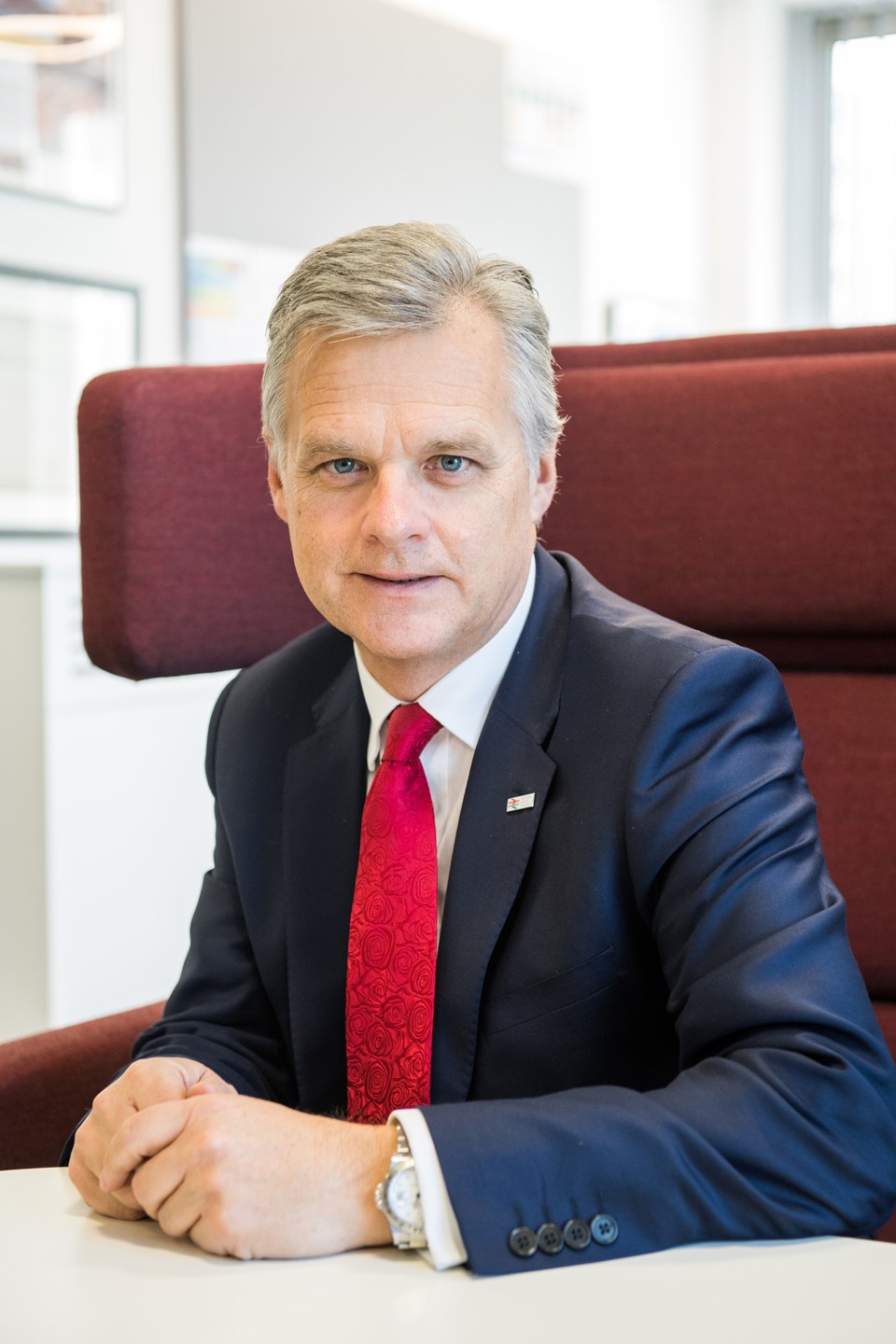
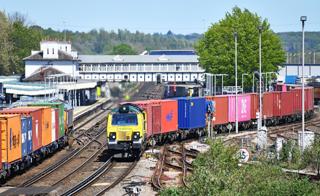
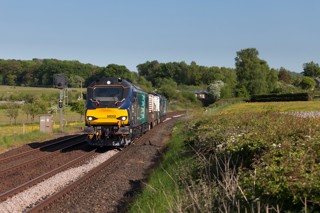
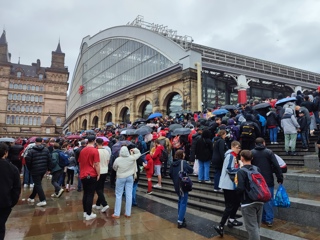
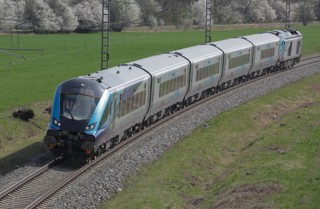
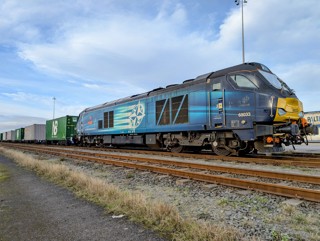











Login to comment
Comments
No comments have been made yet.